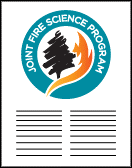United States Joint Fire Science Program

Joint Fire Science Program Research Project Reports
Document Type
Article
Date of this Version
2012
Citation
Published by JFSP
Abstract
Many U.S. forests, especially those with historically short-interval, low- to moderate-severity fire regimes, are too dense and have excessive quantities of fuels. Widespread treatments are needed to restore ecological integrity and reduce the high risk of destructive, uncharacteristically severe fires in these forests. Among possible treatments, however, the appropriate balance among cuttings, mechanical fuel treatments, and prescribed fire is often unclear. For improved decisionmaking, resource managers need much better information about the consequences of alternative management practices involving fire and mechanicaVmanual "fire surrogates." Long-term, interdisciplinary research thus should be initiated to quantify the consequences and tradeoffs of alternative fire and fire surrogate treatments. Ecological, economic and social aspects must all be included as integral components. The research needs to be experimental, rather than retrospective or correlative, to permit stronger inferences about cause-and-effect relationships. Only through such research will it be possible to determine which ecosystem functions of fire can be emulated satisfactorily by other means, which may be irreplaceable, and the implications for management. The human dimensions of the problem are equally important. Treatment costs and utilization economics, as well as social and political acceptability, strongly influence decisions about treatment alternatives. Such research must be a cooperative effort, involving land managers, researchers, and other interested parties. A team of scientists and land managers has designed an integrated national network of long-term research sites to address this need, with support from the USDAIUSDI Joint Fire Science Program (http://www.nifc.gov/joint_fire_sci/index.html). The steering committee and other participants in this national "FirelFire Surrogate" (FFS) study represent a number of federal and state agencies, universities, and private entities, as well as a wide range of disciplines and geographic regions. The study will use a common experimental design to facilitate broad applicability of results.
Included in
Forest Biology Commons, Forest Management Commons, Natural Resources and Conservation Commons, Natural Resources Management and Policy Commons, Other Environmental Sciences Commons, Other Forestry and Forest Sciences Commons, Sustainability Commons, Wood Science and Pulp, Paper Technology Commons


Comments
US government work.